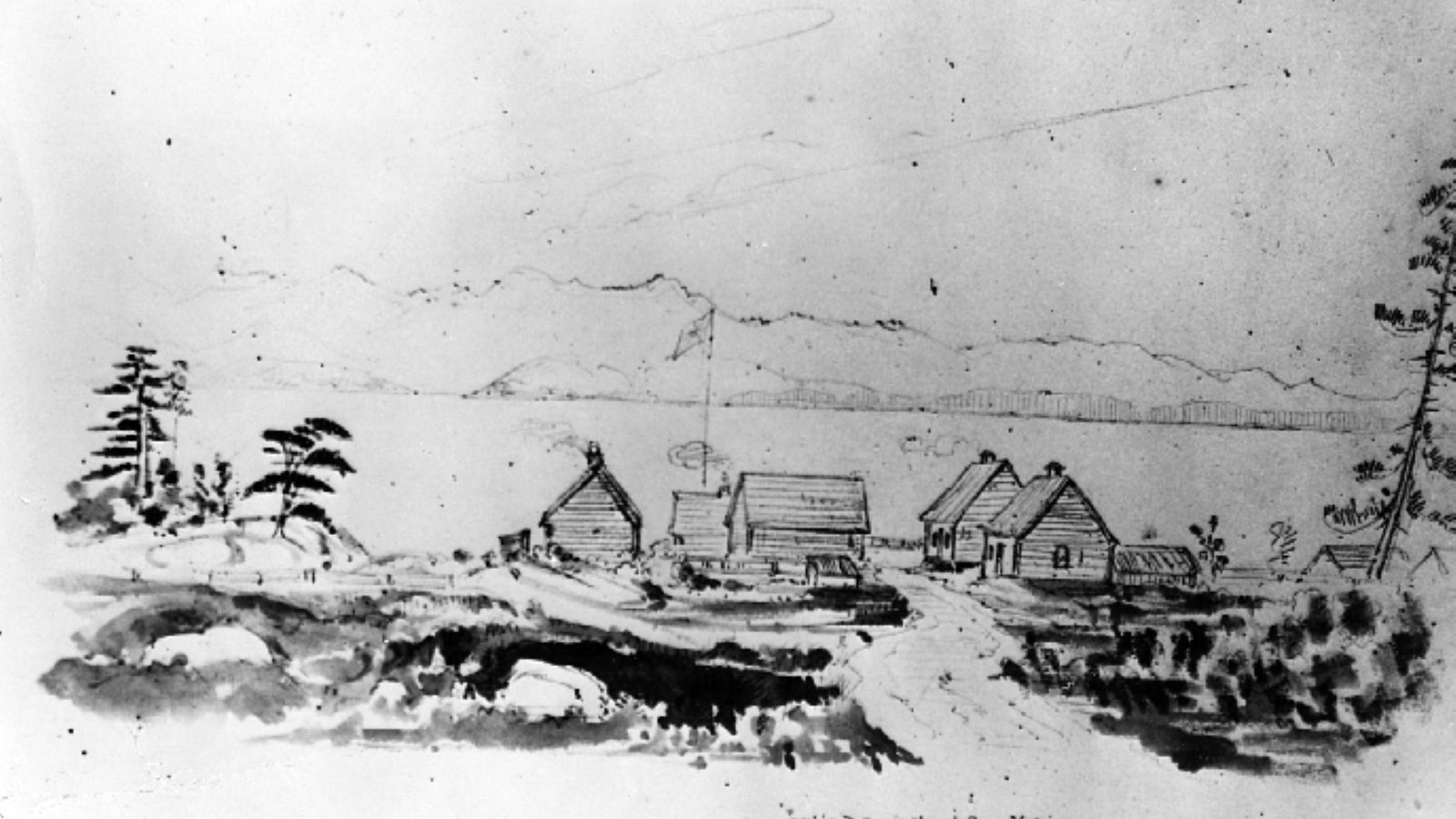Last updated: August 4, 2022
Place
1854 Customs Conflict

On May 10, 1854, Henry Webber, the first American to stay for a significant period on San Juan Island landed on our shores for the second time. Henry Webber was an assistant customs inspector, sent to the island by US customs inspector Isaac Ebey to monitor the newly established Belle Vue Sheep Farm. This British establishment was the first non-native settlement on San Juan Island and its establishment in December of 1853 was intended to assert British sovereignty over the San Juan Archipelago. Henry Webber’s presence was an official maneuver by local American officials that demonstrated that the US did not accept Britain’s claims of sovereignty. Five years prior to the Pig War, Webber and Belle Vue Sheep Farm manager Charles Griffin turned a tense and acrimonious situation into a personal friendship that defused a potential international confrontation.
On April 21, Weber and Ebey came to San Juan Island to confront the Hudson’s Bay Company’s local personnel and assert American sovereignty. After a tense encounter with Belle Vue Sheep Farm manager Charles Griffin, Ebey left Webber in a tent directly behind Griffin’s residence, with an American flag hanging above it. When Griffin’s employees tried to arrest Weber, he “instantaneously presented a revolver pistol at the breast of the constable, telling him if he touched him he would certainly fire, giving as a reason at the time that he did not consider the constable’s office legal……and if he or any other man or men attempted to arrest him he should fire, and otherwise protect himself as long as a ball remained in any one of his pistols; he had two brace of pistols hung about his waste and breast and a knife thrust in his boot at the knee.” The constable retreated and recruited six additional men to serve as reinforcements in his confrontation with Webber, but Griffin refused to authorize them to use weapons.
As night fell, San Juan Island was embroiled in an international standoff and an emotional Griffin wrote “Such a farce! If this is what is called law, then it is plainly rum law.” The next day, Webber left San Juan Island to report to his superiors and Griffin conferred with British officials as well. Both the Americans and British sides decided independently that neither side would use force to assert sovereignty over each other. Consequently, when Webber returned to San Juan Island on May 10, he and Griffin had little reason for conflict. While they reported to their local governments, they were no longer adversaries; in fact, these neighbors quickly became friends as Webber settled down for several months living on San Juan Island.
Though conflict between American officials and the Hudson’s Bay Company would flare up again the next year, it never led to violence. The two nations began a tradition of deliberation and de-escalation that would prove valuable five years later during the Pig War. During the joint occupation (1860-1872), the international friendship which Griffin and Webber initiated would occur between American and British soldiers and officers on San Juan Island. The precedent for British soldiers celebrating the Fourth of July at American Camp had been laid.
On April 21, Weber and Ebey came to San Juan Island to confront the Hudson’s Bay Company’s local personnel and assert American sovereignty. After a tense encounter with Belle Vue Sheep Farm manager Charles Griffin, Ebey left Webber in a tent directly behind Griffin’s residence, with an American flag hanging above it. When Griffin’s employees tried to arrest Weber, he “instantaneously presented a revolver pistol at the breast of the constable, telling him if he touched him he would certainly fire, giving as a reason at the time that he did not consider the constable’s office legal……and if he or any other man or men attempted to arrest him he should fire, and otherwise protect himself as long as a ball remained in any one of his pistols; he had two brace of pistols hung about his waste and breast and a knife thrust in his boot at the knee.” The constable retreated and recruited six additional men to serve as reinforcements in his confrontation with Webber, but Griffin refused to authorize them to use weapons.
As night fell, San Juan Island was embroiled in an international standoff and an emotional Griffin wrote “Such a farce! If this is what is called law, then it is plainly rum law.” The next day, Webber left San Juan Island to report to his superiors and Griffin conferred with British officials as well. Both the Americans and British sides decided independently that neither side would use force to assert sovereignty over each other. Consequently, when Webber returned to San Juan Island on May 10, he and Griffin had little reason for conflict. While they reported to their local governments, they were no longer adversaries; in fact, these neighbors quickly became friends as Webber settled down for several months living on San Juan Island.
Though conflict between American officials and the Hudson’s Bay Company would flare up again the next year, it never led to violence. The two nations began a tradition of deliberation and de-escalation that would prove valuable five years later during the Pig War. During the joint occupation (1860-1872), the international friendship which Griffin and Webber initiated would occur between American and British soldiers and officers on San Juan Island. The precedent for British soldiers celebrating the Fourth of July at American Camp had been laid.
